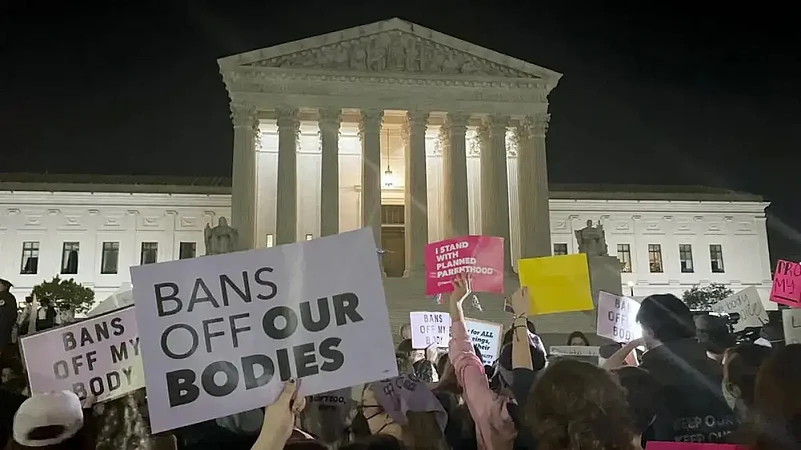The United States Supreme Court on Friday overturned the landmark 1973 Roe Vs Wade judgement that had made abortion a protected right under the American constitution.
Following Friday's ruling, abortion would be banned or limited within the first trimester or early in the second in up to 20 American states, according to Yahoo News.
Its report says 15 states are now expected to outright ban abortion. Three other states are likely to ban abortions after the sixth week of pregnancy and two others have enacted a 15-week abortion limits this year.
Here is all you need to know about the 1973 judgement, its overturning, its significance, and why abortion is such a divisive subject in the West.
Advertisement
What is Roe Vs Wade Judgement?
In 1970, a woman referred to as Jane Roe in court documents at the time to protect her identity filed a case challenging a law in Texas that disallowed abortions except in cases where it was required to save the pregnant woman’s life. The lawsuit was filed against Henry Wade, the district attorney representing Dallas County where the woman resided.
This is how it came to be known as Roe Vs Wade. The woman was later identified as Norma McCorvey. She died in 2017.
McCorvey argued that Texas laws were unconstitutionally vague and abridged her right of personal privacy, protected by the First, Fourth, Fifth, Ninth, and Fourteenth Amendments, as per The Oyez Project of Cornell University, Justia, and Chicago-Kent College of Law.
Advertisement
The case reached the Supreme Court. The question before the court was this – Does the Constitution recognise a woman's right to terminate her pregnancy by abortion?
In its landmark 7-2 judgement, the Court ruled that Texas laws violated the Right to Privacy —a fundamental right— in the US Constitution’s Fourteenth Amendment that protects a pregnant woman’s choice to have an abortion, as per The Oyez Project’s website.
The Court concluded that the Due Process Clause of the Fourteenth Amendment protects the right to privacy from state action and a woman’s choice to have an abortion falls within that right to privacy. However, the Court ruled that states could regulate abortions in the second and third trimesters of pregnancies.
What has the Supreme Court ruled now?
The conservative majority of the Supreme Court on Friday overturned the Roe Vs Wade and another verdict —Planned Parenthood Vs Casey, 1992— that reaffirmed the Roe verdict with a 5-4 majority.
The Court said it should be states, not the judiciary, that should decide on abortions.
"The Constitution does not prohibit the citizens of each State from regulating or prohibiting abortion. Roe and Casey arrogated that authority. The Court overrules those decisions and returns that authority to the people and their elected representatives," said the Court's majority in Friday's ruling.
It further said the American Constitution does not have a right to abortion.
Advertisement
The Court said, "The Constitution does not confer a right to abortion; Roe and Casey are overruled; and the authority to regulate abortion is returned to the people and their elected representatives."
The Court's majority also called the Roe verdict "egregiously wrong and on a collision course with the Constitution from the day it was decided".
"The Constitution makes no reference to abortion, and no such right is implicitly protected by any constitutional provision," said the majority opinion, according to Yahoo News.
Several states have passed laws restricting abortions recently. More are expected to do it now that Supreme Court has overturned the 1973 judgement.
Advertisement
What’s the debate on abortion in United States?
There are two camps on the subject of abortion rights – "pro-choice" who say it’s a woman’s choice to continue a pregnancy or to abort it and "pro-life" who say abortion means killing a life, so they favour disallowing abortions to save a life.
The abortion is a very polarising subject in the United States where Democrats largely support it and Republicans largely oppose it. However, it was not always so. There are still minorities on both sides of political spectrum that differ from the majority’s views on abortion.
President Joe Biden in 1982 voted for a constitutional amendment that would have allowed states to overturn Roe Vs Wade judgement. He said, "I’m probably a victim, or a product, however you want to phrase it, of my background."
Advertisement
Similarly, five of the seven Supreme Court justices who legalised abortions natiowide in Roe Vs Wade judgement were Republicans – something very hard to imagine today.
The divide is primarily rooted in religious beliefs. Pew Research surveys note that 77 per cent White evangelical Protestants want abortion to be illegal in all or most cases, while 21 per cent say it should be legal in at least most instances. Among non-evangilical White Protestents, 63 per cent say abortion should be legal in all or most cases.
“Catholics’ views are more narrowly split – 55 per cent favor legal abortion in all or most cases, while 43 per cent say it should be illegal in all or most cases,” noted Pew.
Advertisement
Fifty-nine per cent of Americans said abortion should be legal in all or most cases, as per Pew. The “some cases” or exceptions to bans that some people advocate include pregnancies caused by rape or incest. Overall, 70 per cent women and 69 per cent men said in a Pew Research survey they do not want Roe v. Wade completely overturned.




















